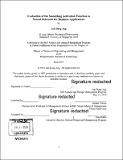Evaluation of the smoothing activation function in neural networks for business applications
Author(s)
Ang, Jun Siong.
Download1119537063-MIT.pdf (16.05Mb)
Other Contributors
Massachusetts Institute of Technology. Engineering and Management Program.
System Design and Management Program.
Advisor
Robert Freund.
Terms of use
Metadata
Show full item recordAbstract
With vast improvements in computational power, increased accessibility to big data, and rapid innovations in computing algorithms, the use of neural networks for both engineering and business purposes was met with a renewed interest beginning in early 2000s. Amidst substantial development, the Softplus and Rectified Linear Unit (ReLU) activation functions were introduced in 2000 and 2001 respectively, with the latter emerging as the more popular choice of activation function in neural networks. Notably, the ReLU activation function maintains a high degree of gradient propagation while presenting greater model sparsity and computational efficiency over Softplus. As an alternative to the ReLU, a family of a modified Softplus activation function - the "Smoothing" activation function of the form g(z) = [mu] log(1 + e[superscript z/[mu]) has been proposed. Theoretically, the Smoothing activation function will leverage the high degree of gradient propagation and model simplicity characteristic of the ReLU function, while eliminating possible issues associated with the non-differentiability of ReLU about the origin. In this research, the performance of the Smoothing family of activation functions vis-à-vis the ReLU activation function will be examined.
Description
Thesis: S.M. in Engineering and Management, Massachusetts Institute of Technology, System Design and Management Program, 2019 Cataloged from PDF version of thesis. Includes bibliographical references (pages R-1 to R-2).
Date issued
2019Department
Massachusetts Institute of Technology. Engineering and Management ProgramPublisher
Massachusetts Institute of Technology
Keywords
Engineering and Management Program., System Design and Management Program.